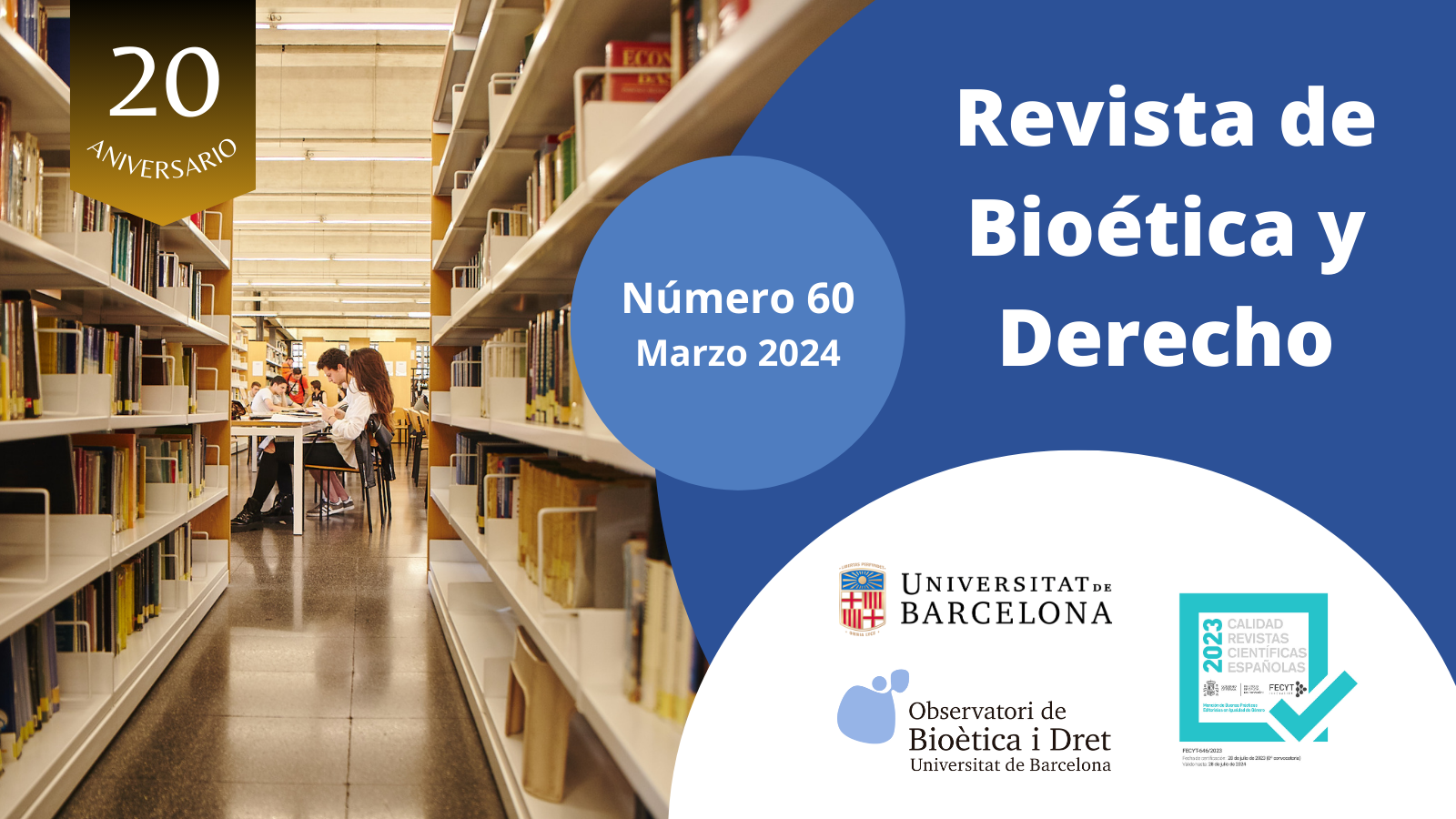Bioethics and democracy in digital society
DOI:
https://doi.org/10.1344/rbd2024.60.42990Keywords:
bioethics, democracy, digital society, artificial intelligence, digital technologiesAbstract
Contemporary society is going through the digital revolution and the need to reflect on the interaction between human beings and digital technologies. The rise of artificial intelligence technologies and social algorithmization has raised questions about the need for ethical monitoring and analysis of information and data on the Internet. As well as the need to verify the influence of digital platforms in the exercise of citizenship. Bioethics enables research on the principles that must be respected in a democratic and digital society. We highlight the principles of social responsibility and non-discrimination with the intention that the benefits of technological use promote the well-being and quality of life of the less favored. Its objective is to guarantee the survival of the human species and the improvement of the protection of the life of all living beings, animals, and plants. Bioethical reflection on the use of artificial intelligence could establish the moral compass that guides the analysis of ethical conflicts and the defense that all human beings must be guaranteed equal opportunities and the conditions to fully carry out their project of life.
References
Bauman, Zygmunt; Mauro, Ezio. (2016). Babel: entre a incerteza e a esperança. Rio de Janeiro: Zahar.
Bauman, Zygmunt; Lyon, David. (2014). Vigilância líquida: diálogos com David Lyon. Rio de Janeiro: Zahar.
Carvalho, André Carlos Ponce de Leon Ferreira de. (2016) Inteligência Artificial: riscos, benefícios e uso responsável. Estudos Avançados, vol. 35, n. 101, pp. 21-36. Disponible en: <https://doi.org/10.1590/s0103-4014.2021.35101.003>.
Cortina, Adela. (2017). Aporofobia, el rechazo al pobre: Un desafío para la democracia. Barcelona: Paidós.
Cortina, Adela. (2005). Bioética: un impulso para la ciudadanía activa. Revista Brasileira de Bioética, vol. 1, n. 4, pp. 337-349.
Echarri, Miquel (2021). 150 demissões em um segundo: os algoritmos que decidem quem deve ser mandado embora. El País. Disponible en: < https://brasil.elpais.com/tecnologia/2021-10-10/150-demissoes-em-um-segundo-assim-funcionam-os-algoritmos-que-decidem-quem-deve-ser-mandado-embora.html?prm=copy_link>.
Floridi, Luciano. (2021). Os três “Cs” da revolução digital. Entrevista com Luciano Floridi. Instituto Humanitas Unisinos. Disponible en: <http://www.ihu.unisinos.br/78-noticias/611828-os-tres-cs-da-revolucao-digital-entrevista-com-luciano-floridi>.
Gracia Guillén, Diego. (2001). Democracia y Bioética. Acta Bioethica, vol. VII, n. 2, pp. 343-354.
Habermas, Jürgen. (2002). A inclusão do outro: estudos de teoria política. São Paulo: Loyola.
Habermas, Jürgen. (1998). Facticidad y Validez: sobre el derecho y el Estado democrático de derecho en términos de teoría del discurso. Madrid: Trotta.
Han, Byung-Chul. (2021). No-cosas: quebra del mundo hoy. Madrid: Editorial Taurus.
Idoeta, Paula Adamo. (2021). Por que algoritmos das redes sociais estão cada vez mais perigosos, na visão de pioneiro da Inteligência Artificial. BBC News Brasil. Disponible en: <https://www.bbc.com/portuguese/geral-58810981>.
Lee, Kai-Fu. (2019). Inteligência artificial: como os robôs estão mudando o mundo, a forma como amamos, nos relacionamos, trabalhamos e vivemos. Rio de Janeiro: Globo Livros.
Lipovetsky, Gilles. (2005). El crepúsculo del deber: La ética indolora de los nuevos tiempos democráticos. Barcelona: Editorial Anagrama.
Ludermir, Teresa Bernarda. (2021). Inteligência Artificial e Aprendizado de Máquina: estado atual e tendências. Estudos Avançados, vol. 35, n. 101, pp. 85-94. Disponible en: <https://doi.org/10.1590/s0103-4014.2021.35101.007>.
Pessini, Leo; Sganzerla, Anor; Zanella, Diego Carlos. (2018). Van Rensselaer Potter: um bioeticista original. São Paulo: Loyola.
Potter, Van Rensselaer; Potter, Lisa. (2018a). Bioética global: Convertendo o desenvolvimento sustentável em sobrevivência global. En: Pessini, Leo; Sganzerla, Anor; Zanella, Diego Carlos. Van Rensselaer Potter: um bioeticista original. São Paulo: Loyola.
Potter, Van Rensselaer. (2018b). Bioética Global: Construindo a partir do legado de Leopold. São Paulo: Edições Loyola.
Potter, Van Rensselaer. (2018c). Transcrição do vídeo do Simpósio Internacional de Bioética (Rijeka, Croácia, 2001). En: Pessini, Leo; Sganzerla, Anor; Zanella, Diego Carlos. Van Rensselaer Potter: um bioeticista original. São Paulo: Loyola.
Potter, Van Rensselaer. (2016). Bioética: Ponte para o futuro. São Paulo: Loyola.
Russell, Stuart. (2021). Inteligência artificial a nosso favor: Como manter o controle sobre a tecnologia. São Paulo: Companhia das Letras.
Schwab, Klaus. (2016). A quarta revolução industrial. São Paulo: Edipro.
Sichman, Jaime Simão. (2021). Inteligência Artificial e sociedade: avanços e riscos. Estudos Avançados, vol. 35, n. 101, pp. 37-50. Disponible en: <https://doi.org/10.1590/s0103-4014.2021.35101.004>.
Simons, Josh. (2023). Algorithms for the People: Democracy in the age of a IA. Princeton: Princeton University Press.
Spinsanti, Sandro. (2018). Um encontro com Van Rensselaer Potter. En: Pessini, Leo; Sganzerla, Anor; Zanella, Diego Carlos (2018). Van Rensselaer Potter: um bioeticista original. São Paulo: Loyola.
Sunstein, Cass R. (2001). Designing democracy: What constitutions do. Oxford: Oxford University Press.
UNESCO. (2021). Informe de la Comisión de Ciencias Sociales y Humanas (SHS): Proyecto de texto de la Recomendación sobre la ética de la inteligência artificial. Disponible en: <https://unesdoc.unesco.org/ark:/48223/pf0000379920_spa.locale=en>.
UNESCO. (2020). Comités de Bioética y Participación Pública. Disponible en: <https://unesdoc.unesco.org/ark:/48223/pf0000374938.locale=en>.
UNESCO. (2020). First draft of the recommendation on the Ethics of Artificial Intelligence. Disponible en: <https://unesdoc.unesco.org/ark:/48223/pf0000373434>.
UNESCO. (2019). Preliminary study on a possible standard-setting instrument on the ethics of artificial intelligence. Disponible en: <https://unesdoc.unesco.org/ark:/48223/pf0000369455>.
UNESCO. (2005). Declaração Universal sobre Bioética e Direitos humanos. Disponible en: <https://unesdoc.unesco.org/ark:/48223/pf0000146180_por.locale=en>.
Downloads
Published
How to Cite
Issue
Section
License
Copyright (c) 2024 Alberto Paulo Neto

This work is licensed under a Creative Commons Attribution-NonCommercial-NoDerivatives 4.0 International License.
 The author retains the copyright and grants Revista de Bioética y Derecho the right of first publication of the article. All articles published in Revista de Bioética y Derecho are under Creative Commons licensing Recognition – Non Commercial – NoDerivedArtwork (by-nc-nd 4.0), which allows sharing the content with third parties, provided that they acknowledge its authorship, initial publication in this journal and the terms of the license. No commercial use of the original work or generation of derivative works is permitted.
The author retains the copyright and grants Revista de Bioética y Derecho the right of first publication of the article. All articles published in Revista de Bioética y Derecho are under Creative Commons licensing Recognition – Non Commercial – NoDerivedArtwork (by-nc-nd 4.0), which allows sharing the content with third parties, provided that they acknowledge its authorship, initial publication in this journal and the terms of the license. No commercial use of the original work or generation of derivative works is permitted.







